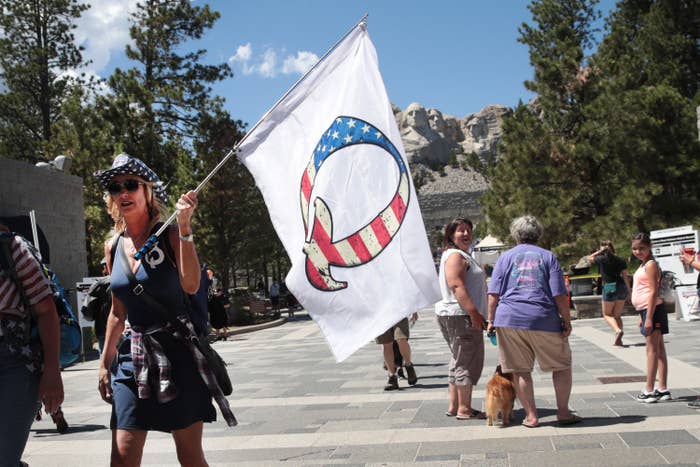
WASHINGTON — The House voted to formally condemn QAnon — a collective delusion that alleges President Donald Trump is fighting a Satan-worshipping cabal of elites who abuse children — on Friday, three days after its followers targeted Democratic Rep. Tom Malinowski with death threats.
The resolution, which passed the House 371–18, also comes as at least one avowed QAnon believer is expected to be elected to Congress next month. Marjorie Taylor Greene, who has also posted a photo of herself holding a gun next to images of Rep. Alexandria Ocasio-Cortez and other members of the "Squad," won the Republican primary for a Georgia seat earlier this year and is very likely to win in November. Several other QAnon followers have won Republican primaries.
Malinowski coauthored the bipartisan resolution condemning QAnon with Republican Rep. Denver Riggleman back in August, two weeks after Greene won her primary and after Trump called her a “future Republican Star.” Trump has praised QAnon, despite Q’s frequent anti-Semitism, the fact that their followers have a history of turning their beliefs into real-world violence, and that the FBI has labeled the group a domestic terror threat.
Seventeen Republicans voted against the resolution on Friday, as did Libertarian Rep. Justin Amash. One member, Republican Rep. Andy Harris of Maryland, voted “present.”
On Tuesday, Malinowski was targeted in a “Q-drop” — one of the self-proclaimed US government insider’s conspiracy-filled posts on message boards. As BuzzFeed News reported Wednesday, the post mentioned Malinowski’s resolution, but it also included a screenshot of a false attack from the National Republican Campaign Committee alleging that Malinowski “lobbied to protect sexual predators.”
The false attack — which the NRCC also included in a debunked TV ad in which a narrator says, “Tom Malinowski chose sex offenders over your family” — echoes a core belief of QAnon followers: that powerful Democrats and global elites are engaged in child trafficking. Adherents have actually hindered law enforcement going after child trafficking by overwhelming them with false conspiracy theories.
Malinowski quickly started getting death threats after Q’s post went up Tuesday, which his office reported to the Capitol Police. And the NRCC, the campaign arm of House Republicans, has only doubled down on the false attack since then. The NRCC is currently run by Rep. Tom Emmer, who voted for the resolution Friday. Malinowski told BuzzFeed News that he spoke to Emmer about the NRCC attacks and how they could play into QAnon's hands before the Q drop targeted him. “He said, ‘I don’t know what Q is’ and walked away. … He said, 'I can’t be responsible for, you know, how people use our stuff and I don’t know what that is,'” Malinowski said.
(Emmer traveled with Trump on Air Force One on Wednesday before the president tested positive for the coronavirus and was tested Friday, according to his office. He voted in person on Friday and has not announced any test results.)
The Republicans who voted against the anti-QAnon resolution are Reps. Jodey Arrington, Michael Burgess, Bill Flores, and Brian Babin of Texas; Rob Bishop of Utah; Mo Brooks of Alabama; Buddy Carter and Drew Ferguson of Georgia; Warren Davidson of Ohio; Jeff Duncan and Ralph Norman of South Carolina; Paul Gosar of Arizona; Mike Kelly and Scott Perry of Pennsylvania; Tom Tiffany of Wisconsin; Daniel Webster of Florida; and Steve King of Iowa.
King, a racist, lost the Republican primary for his seat this summer and will not return to Congress next year. Republicans removed King from his committee assignments in 2019 after he questioned why "white nationalist" and "white supremacist" are "offensive" in a New York Times interview. Congress did not, however, attempt to expel King from the House or even censure him. Instead, Democrats passed a resolution condemning white supremacy that only mentioned King once; even King voted for it.
The anti-QAnon resolution passed Friday isn't binding law; it expresses the sentiment of the House as a whole. In addition to condemning QAnon, it calls on the FBI and other federal law enforcement to “strengthen their focus on preventing violence, threats, harassment, and other criminal activity by extremists motivated by fringe political conspiracy theories.” It also “encourages” the intelligence community to investigate whether QAnon is getting financial support or online amplification from foreign actors and if it is coordinating with any “foreign extremist organizations or groups espousing violence."
Amash, who left the Republican Party in 2019, said in a statement that he voted no because the resolution "threatens protected speech" and argued that it "may make things worse" by encouraging the intelligence community and the FBI to go after QAnon, which would confirm followers' fears of a "deep state that's fighting against them."
Arrington said in a statement that he also voted against Friday's resolution because of First Amendment concerns. "There is a world of difference between conspiracy and criminal - one is protected by the First Amendment; the other should be condemned in all forms," he said.
But Arrington added that he also voted against it because the resolution made no reference to Antifa "and other radical Leftist groups."
UPDATE
This story was updated with a statement from Rep. Jodey Arrington.

